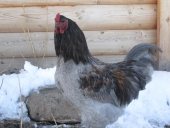
 1
1





 3
3




 4
4




 I have had enough run ins with boys in the past and still have a bad left knee to show for it (rooster stuck his spurs in it). But if I'm going to become more self sufficient then a boy is required.
I have had enough run ins with boys in the past and still have a bad left knee to show for it (rooster stuck his spurs in it). But if I'm going to become more self sufficient then a boy is required. 1. my projects
 2
2




Seed the Mind, Harvest Ideas.
http://farmwhisperer.com
 1
1





 1
1





 1
1




 I liked your comment but wasn't sure which way it was going. Is the Orpington a bit on the wimpy side? Wimpy rooster is what I'm looking for.
I liked your comment but wasn't sure which way it was going. Is the Orpington a bit on the wimpy side? Wimpy rooster is what I'm looking for.1. my projects

 2
2




Seed the Mind, Harvest Ideas.
http://farmwhisperer.com

 1
1




 2
2




 1
1




1. my projects

 1
1




 1
1




John Polk wrote:
The RIRs are at the top of the class of brown egg layers, but the roos do indeed have a reputation of not being very people friendly.
The sex-links are also excellent layers, but since they are hybrids, they will not breed true. They are some of the most docile/people friendly hens around (and often, the first in the flock to begin laying). Since they will not breed true, I know of nobody that keeps the roos beyond freezer camp, but I would imagine that they would continue to breed good, docile egg layers...worth a try for a generation or two.
As far as production is concerned, nothing has ever beat a white leghorn. typically, they are very flighty. They will produce more (white) eggs per pound of food than any other breed. They have, unfortunately, had foraging, & broodiness bred out of them. Their production years are also short...first molted feather is a capital offense, punishable by death!

 2
2




 1
1





 1
1




 1
1




 2
2





 1
1




Kathleen Sanderson wrote:
He was a Mille Fleur Leghorn from Sand Hill Preservation Center,
1. my projects
 2
2




 2
2




1. my projects
 1
1




 1
1




John Polk wrote:
The sex-links are also excellent layers, but since they are hybrids, they will not breed true. They are some of the most docile/people friendly hens around (and often, the first in the flock to begin laying). Since they will not breed true, I know of nobody that keeps the roos beyond freezer camp, but I would imagine that they would continue to breed good, docile egg layers...worth a try for a generation or two.
 1
1




 1
1




 1
1




 1
1




 1
1




 1
1




I've had a few speckled sussex, they're about my favorite as chickens go. The one roo we had got a little touchy around kids (esp. strange ones) but he wasn't really ambitious about it. If my kids and their friends were a little bigger, I might have kept him, I like a roo that can identify strangers.Anyone had Sussex chickens before?
How are their roosters?
 1
1




EmileSpecies wrote:
Bantams are what I plan on keeping in the future... according to several sources I have read, they make 2/3 the eggs of a normal chicken, on only 1/4 the feed.
 1
1






 1
1




 1
1




How permies.com works
What is a Mother Tree ?

 1
1





 1
1




 1
1




 1
1




 1
1




 1
1




Kathleen Sanderson wrote:
The sex-links that you can buy from hatcheries and feed stores are bred from special lines of the parent breeds. In other words, the Barred Rocks and RIR's that you can buy from the same hatcheries may not produce the really high-laying birds that you expect from a sex-link. Ditto for Cornish X -- their parent breeds are special lines that most of us don't have access to. We could cross the White Cornish (if you can find some -- most hatcheries don't even carry these) with White Rocks, which is the parent cross for Cornish X, but we wouldn't get the big, fast-growing, meaty birds that we can buy. However, we might get something like the Slow White broilers that a couple of hatcheries sell, which, for homesteaders, would actually be preferable to the commercial Cornish X.
All that said, I like my ducks of unknown breed! Good layers and good temperament, and duck eggs are a lot more nutritious than chicken eggs! Plus they lay all their eggs early in the morning....They don't fly over fences, they eat slugs, and they can be herded (once they are used to it). Just try herding chickens, LOL!
Kathleen
 1
1





| I agree. Here's the link: http://stoves2.com |








